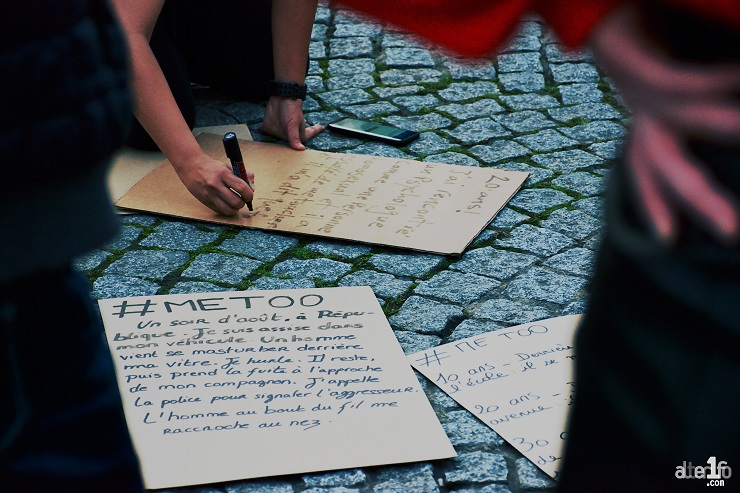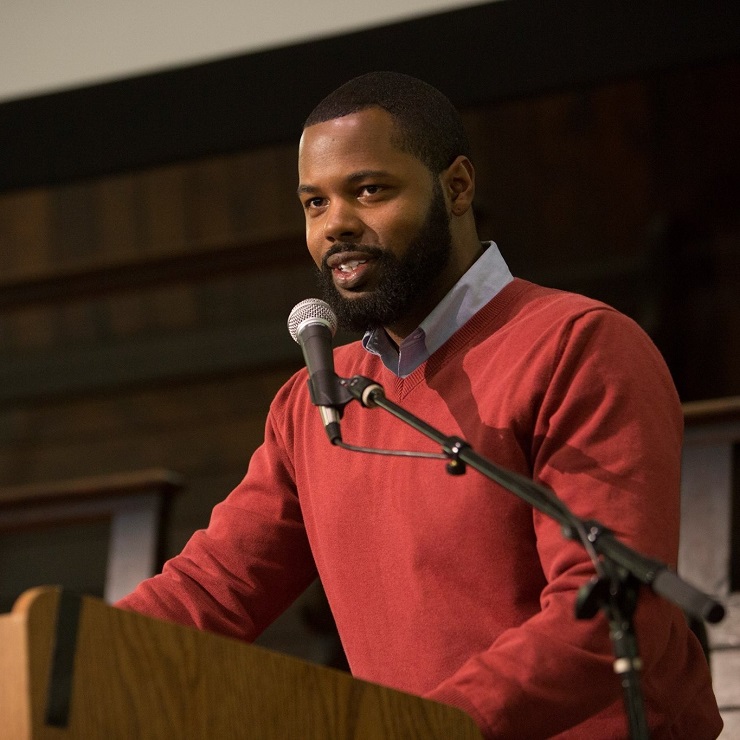
Un jour, une photo… Agresseurs, violeurs... à vous d'avoir peur! by Alter1fo // Flickr CC License Alter1fo
If you are on social media, you have probably seen the #MeToo hashtag. It has been sparked by the numerous women who have come forward to voice the sexual abuse they’ve suffered from Harvey Weinstein. This, along with the previous sexual revelations about Trump, has caused an outcry for justice and encouraged everyday women from around the world to speak up about the abuse that they, too, have suffered at the hands of men.
Last week, I spoke with male-identifying AFSC staff members, Michael Merryman-Lotze, Jordan Garcia and Joshua Saleem and asked them what their reflections were and what they thought healthy masculinity means. Their responses also continue the conversation from a past post we did, “What does healthy masculinity look like?” and aligns with social media’s response from men who have been posting under the hashtag #HowIWillChange. - Chrissie
“In the end what hurts us most is not the words of our enemies, but the silence of our friends." Martin Luther King Jr.
When Tarana Burke started the #MeToo movement more than ten years ago, it was men’s toxic masculinity that was the cause of rampant sexual violence. Today, men’s toxic masculinity is the cause of rampant sexual violence. Not nearly enough has changed. Men’s unexamined privilege means many have declined to say anything about it even when it continues to effect women, girls and young boys - showing few signs of stopping. #MeToo shouldn’t just “give people a sense of the magnitude of the problem,” it should incite the kind of change that puts an end to sexual violence. But it can’t do that without men changing.
We keep talking about getting men to speak out and I guess that’s true, but honestly, what we need more than that is for men to stop raping people. Men are the primary perpetrators of the violence - sexual and otherwise. And they are not scary boogey men, they’re friends of yours, they’re your brothers, co-workers and neighbors. However, when they perpetrate violence they don’t lose their status, they don’t lose their jobs or get booed out of town or even off stage. They don’t have to change, we have yet to demand it of them.
But of course, it’s imperative that men speak out, although it’s sexist that when men do it has more weight in our culture. That power comes with responsibility, and if you’re not using it then your silence is betrayal. Caring deeply is not enough; what we need is for men to stop raping people. We all need to demand a stop to it.
Thank goodness there are women who don’t back down despite the efforts of many men and some women who try and get them to do so. Thank goodness for the leadership of women, otherwise, where would we be?
- Jordan Garcia

Because I’m guilty of this too, I would caution us men who are tempted to put ourselves on a spectrum with good guys on one end and bad guys on the other. Instead, we need to do the work of asking how we’ve contributed to spaces and a society where every woman in our lives has a #MeToo status. For example, at a recent high school workshop there was a young man who brought up emotion and feelings as things to quickly move past and get over. I told him that we’re given messages as boys that tell us we can’t feel or emote because that is feminine. I challenged him in the same way I challenge myself to recognize those negative messages about masculinity and do the work to unpack the violence those messages do to us internally and externally to the people around us.
The good people over at Very Smart Brothas recently ran a piece called, “Straight Black Men Are the White People of Black People.” In the same way some white folks can see racism as something related to the alt-right or neo Nazi groups and not wrestle with how their own privilege perpetuates white supremacy, men can see sexism and sexual harassment/assault as something confined to those “bad” men (i.e. rapists, abusers, etc.) instead of doing the work to uncover how our male privilege, especially hetero male privilege, creates and sustains environments that are not safe for women.
- Joshua Saleem

It is wonderful that the painful and personal #MeToo stories shared by women have moved men to think about how they will change. As men, we need to hold ourselves and other men accountable for our behaviors. We need to admit to the ways in which we are complicit both directly and indirectly in harmful actions. We need to be at the forefront of change, and I acknowledge that I have not done enough in this regard.
But as we (men) approach change, I think we must also recognize that we are coming to the struggle late and that work to challenge rape culture, misogyny, and toxic masculinity has been going on for decades (generations). We must be careful, as we respond to new convictions, to not fall back into problematic power dynamics that center male power and privilege. We need to make sure that we are not stepping over or on the women who we say we want to support. We need to decenter ourselves.
The change that is needed also isn’t simply individual and personal change. We can’t only consider “how I will change.” We must also figure out how we will work to change society as a whole; how we will join with others to undermine power systems and structures that accept and normalize sexist and violent behavior by men. And, for men, undermining those systems means stepping back, listening to, supporting, and standing behind/beside women and others already leading work to change those systems and structures.
Finally, listening, really listening, feels key. If we (men) need to see #MeToo posts from the women in our lives to understand that harassment and rape culture are endemic problems that haven’t been addressed, then we haven’t been listening to women. The fact that women find it necessary to share #MeToo posts and stories means that we have not been listening to or adequately supporting them in the face of sexism, harassment, and assault. We must recognize our collective failure and do better.
- Michael Merryman-Lotze
Related posts